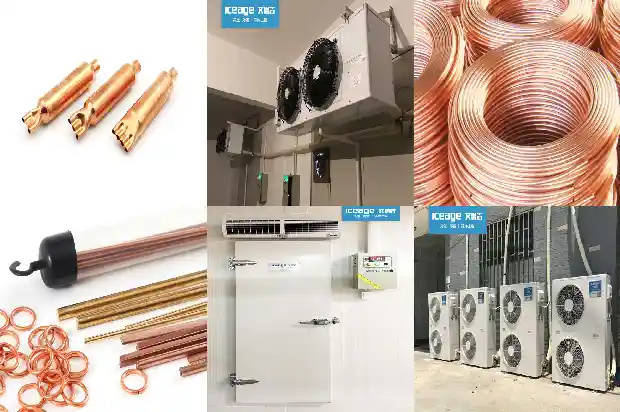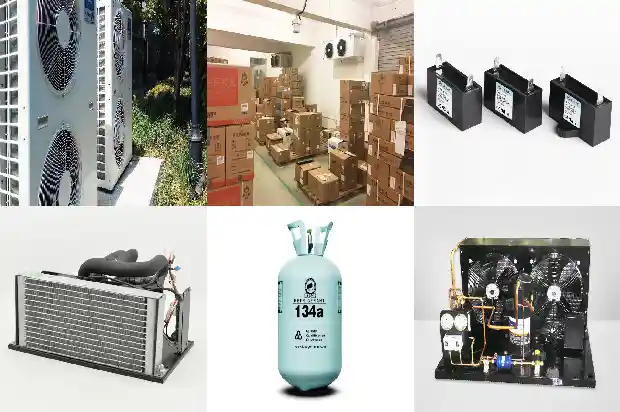28 Kinds of Refrigerants: A Comprehensive Collection - All You Want to Know!
2025-04-04
- R134a (Tetrafluoroethane)
The refrigerant R134a is currently one of the main refrigerants internationally recognized as a substitute for R12. It is commonly used in vehicle air - conditioners, commercial and industrial refrigeration systems, as a blowing agent in the production of rigid plastic insulation materials, and can also be used to formulate other mixed refrigerants, such as R404A and R407C.
Main applications: It mainly replaces R12 as a refrigerant and is widely used in automotive air - conditioners and refrigerator refrigeration. - R410A
Physical and chemical properties: At normal temperature and pressure, R410A is a chlorine - free fluorinated alkane non - azeotropic mixed refrigerant. It is a colorless gas, and when stored in a cylinder, it is a compressed liquefied gas. Its ODP is 0, so R410A is an environmentally friendly refrigerant that does not damage the atmospheric ozone layer.
Main applications: R410A is mainly used to replace R22 and R502. It has characteristics such as being clean, low - toxicity, non - flammable, and having good refrigeration performance. It is widely used in household air - conditioners, small commercial air - conditioners, and household central air - conditioners. Packed in cylinders with net weights of 11.3kg, 500kg, and 1000kg. - R407C
At normal temperature and pressure, R407C is a chlorine - free fluorinated alkane non - azeotropic mixed refrigerant. It is a colorless gas, and when stored in a cylinder, it is a compressed liquefied gas. Its ODP is 0, so R407C is an environmentally friendly refrigerant that does not damage the atmospheric ozone layer.
Main applications: R407C is mainly used to replace R22. It has characteristics such as being clean, low - toxicity, non - flammable, and having good refrigeration performance. It is widely used in household air - conditioners and small - to - medium - sized central air - conditioners. Packed in cylinders with net weights of 11.3kg, 500kg, and 1000kg. - R417A
At normal temperature and pressure, R417A is a chlorine - free fluorinated alkane non - azeotropic mixed refrigerant. It is a colorless gas, and when stored in a cylinder, it is a compressed liquefied gas. Its ODP is 0, so R417A is an environmentally friendly refrigerant that does not damage the atmospheric ozone layer.
Main applications: R417A is mainly used to replace R22. It has characteristics such as being clean, low - toxicity, non - flammable, and having good refrigeration performance. It is used in heat pumps (OEM initial installation to replace R22) and air - conditioners (after - sales replacement of R22). Packed in cylinders with net weights of 11.3kg, 400kg, and 1000kg. - R404A
R404A is a chlorine - free non - azeotropic mixed refrigerant. At normal temperature and pressure, it is a colorless gas, and when stored in a cylinder, it is a compressed liquefied gas. Its ODP is 0, so R404A is an environmentally friendly refrigerant that does not damage the atmospheric ozone layer.
Main applications: R404A is mainly used to replace R22 and R502. It has characteristics such as being clean, low - toxicity, non - flammable, and having good refrigeration performance. It is widely used in medium - and low - temperature refrigeration systems. Packed in cylinders with net weights of 10.9kg and 1000kg. - R507
R507 is a chlorine - free azeotropic mixed refrigerant. At normal temperature and pressure, it is a colorless gas, and when stored in a cylinder, it is a compressed liquefied gas. Its ODP is 0, so R507 is an environmentally friendly refrigerant that does not damage the atmospheric ozone layer.
Main applications: R507 is mainly used to replace R22 and R502. It has characteristics such as being clean, low - toxicity, non - flammable, and having good refrigeration performance. It is widely used in medium - and low - temperature refrigeration systems. Packed in cylinders with net weights of 11.3kg and 400kg. - R23 (Trifluoromethane)
R23 (Trifluoromethane, FREON23) has a boiling point of - 82.
1℃ at normal pressure, a freezing point of - 155.2℃, a liquid density (at 25℃) of 0.67 kg/L, a critical density of 0.525kg/L, a critical pressure of 4.83 MPa, and an ozone - depleting potential (ODP) of 0. It is an environmentally friendly refrigerant.
Main applications: Trifluoromethane, also known as HFC - 23, is a high - pressure liquefied gas. It can be used as a refrigerant to replace CFC - 13. At the same time, it is an ideal substitute for Halon 1301, with characteristics such as being clean, low - toxicity, and having good fire - extinguishing effects. - R508A
R508A is a chlorine - free azeotropic mixed refrigerant. At normal temperature and pressure, it is a colorless gas, and when stored in a cylinder, it is a compressed liquefied gas. Its ODP is 0, so R508A is an environmentally friendly refrigerant that does not damage the atmospheric ozone layer.
Main applications: R508A is mainly used to replace R13, R23, and R503. It has characteristics such as being clean, low - toxicity, non - flammable, and having good refrigeration performance. It is widely used in ultra - low - temperature refrigeration systems, such as medical refrigeration and scientific research refrigeration. Packed in cylinders with net weights of 10kg and 20kg. - R508B
R508B is a chlorine - free azeotropic mixed refrigerant. At normal temperature and pressure, it is a colorless gas, and when stored in a cylinder, it is a compressed liquefied gas. Its ODP is 0, so R508B is an environmentally friendly refrigerant that does not damage the atmospheric ozone layer.
Main applications: R508B is mainly used to replace R13, R23, and R503. It has characteristics such as being clean, low - toxicity, non - flammable, and having good refrigeration performance. It is widely used in ultra - low - temperature refrigeration systems, such as medical refrigeration and scientific research refrigeration. Packed in cylinders with net weights of 10kg and 20kg.
- R152a (Difluoroethane)
HFC - 152a (1,1 - Difluoroethane, CH3CHF2), with a molecular weight of 66.1, a boiling point of - 24.7℃, a critical temperature of 113.5℃, a critical pressure of 4.58MPa, a combustion limit in air of 5.1 - 17.1% (V/V), and an ozone - depleting potential value (ODP) of 0.
Main applications: It is mainly used as a refrigerant, blowing agent, aerosol, and cleaning agent. It is also an important component of mixed working fluids. Available in 18kg/bottle and 640kg/bottle. - R22 (Chlorodifluoromethane)
R22 (Freon22, Chlorodifluoromethane), with the molecular formula CHClF2 and a molecular weight of 86.47. R - 22 is a colorless, nearly odorless gas at normal temperature. It is non - flammable, non - corrosive, and has extremely low toxicity. It can be liquefied into a colorless and transparent liquid under pressure and is an HCFC - type refrigerant. The chemical stability and thermal stability of R - 22 are very high. Especially in the absence of water, it does not react with common metals below 200℃. When water is present, it only reacts slowly with alkalis. However, it will crack at high temperatures. - R123 (Dichlorotrifluoroethane)
Trifluorodichloroethane (2,2 - Dichloro - 1,1,1 - trifluoroethane), with the molecular formula CF3CHCl2, a molecular weight of 152.93, a boiling point of 27.85℃, a CAS registration number of 306 - 83 - 2, an ozone - depletion potential (ODP) of 0.02, and a global warming potential (GWP) of 93, is an HCFC - type refrigerant that replaces R - 11 (F11).
Main applications: R123 can replace F - 11 and F - 113 as a cleaning agent, blowing agent, and refrigerant (central air - conditioner / centrifugal chiller). - R124 (Chlorotetrafluoroethane)
Chlorotetrafluoroethane CHClFCF3, HCFC - 124 (R124), with a molecular weight of 136.5, a boiling point of - 10.95℃, a critical temperature of 122.25℃, a critical pressure of 3.613MPa, an ozone - depleting potential value (ODP) of 0.02, and a global warming coefficient value (GWP) of 0.10.
Main applications: HCFC - 124 (R124) is mainly used as a refrigerant and fire extinguishing agent. It is an important component of mixed working fluids and can replace CFC - 114. Packed in cylinders, 13.6kg/bottle. - R141b (Dichloro - fluoroethane)
Dichloro - fluoroethane CH3CCl2F, HCFC - 141b, with a molecular weight of 116.95, a boiling point of 32.05℃, a critical temperature of 204.5℃, a critical pressure of 4.25MPa, an ozone - depleting potential value (ODP) of 0.11, and a global warming coefficient value (GWP) of 0.09. - R142b (Chlorodifluoroethane)
Chlorodifluoroethane CClF2CH3, HCFC - 142b, with a boiling point of - 9.2℃, a critical temperature of 136.45℃, a critical pressure of 4.15MPa. It is a colorless gas at normal temperature, with a slight aromatic smell, easily soluble in oil, and difficult to dissolve in water.
Main applications: HCFC - 142b (R - 142b) is mainly used in refrigeration systems in high - temperature environments, as an intermediate for thermostatic control switches and aviation propellants, and also as a chemical raw material. Packed in cylinders, 13.6kg/bottle and 400kg/bottle. - R402A
Composition of R - 402A: R - 22, R - 290, and HFC - 125. It is an HCFC service - type blended refrigerant. It meets the A1 safety class category of the American Society of Heating, Refrigerating and Air - Conditioning Engineers (ASHRAE) (this is the highest level and is harmless to the human body); it complies with the standards of the US environmental protection organization EPA, SNAP, and UL. Alkylbenzene (AB) synthetic oil is recommended for the refrigeration oil.
Main applications: It is used to replace R - 502 in commercial refrigeration equipment and some transportation refrigeration facilities, and is suitable for all environments where R - 502 can operate normally. Packed in cylinders, 12.2kg/bottle. - R402B
Composition of R - 402B: R - 22, R - 290, and HFC - 125. It is an HCFC service - type blended refrigerant. It meets the A1 safety class category of the American Society of Heating, Refrigerating and Air - Conditioning Engineers (ASHRAE) (this is the highest level and is harmless to the human body); it complies with the standards of the US environmental protection organization EPA, SNAP, and UL. Alkylbenzene (AB) synthetic oil is recommended for the refrigeration oil.
Main applications: It is used to replace R - 502 in large - scale commercial refrigeration equipment, such as ice - making machines. It is suitable for all environments where R - 502 can operate normally. Packed in cylinders, 11.8kg/bottle. - R408A
The refrigerant R408A is a blended working fluid composed of R22, R125, and R143a. It is a colorless gas at normal temperature, with a molecular weight of 87.01, a boiling point of - 44.4℃, a critical temperature of 83.8℃, a critical pressure of 4.42MPa, and an ozone - depleting potential value (ODP) of 0.016.
Main applications: The R408A refrigerant is mainly used to replace R502. Available in disposable cylinders of 10.9kg/bottle and recyclable cylinders of 350kg/bottle.
- R409A
R409A is a mixture of HCFC - 22, HCFC - 124, and HCFC - 142b. It is a colorless gas at normal temperature. Its molecular weight is 97.4, boiling point is - 34.5℃, critical temperature is 106.8℃, critical pressure is 4.69MPa, and ozone - depleting potential value (ODP) is 0.039.
Main applications: R409A is a substitute for R12 and is mainly used in refrigeration systems. Packed in 13.6kg cylinders and recyclable cylinders of 400kg/bottle. - R11 (Trichlorofluoromethane)
Alias Freon - 11 (FREON 11), molecular formula: CCl3F, molecular weight: 137.37. It is a colorless liquid or gas; melting point - 111℃, boiling point 23.7℃, specific gravity 1.487×10³ kg/m³, with an ether - like odor, slightly soluble in water, easily soluble in ethanol and ether, and has good chemical stability.
Main applications: It is used as a refrigerant for large - scale central air - conditioners (centrifugal chillers) and as a blowing agent for polyurethane (PU) foam plastics. Packed in 250KG/200L steel drums (coated with PVF inside). - R12 (Dichlorodifluoromethane)
R12 is a colorless, odorless, non - corrosive gas at normal temperature, and can be liquefied into a colorless and transparent liquid under pressure. R12 is non - toxic, non - flammable, and has good thermal stability and chemical stability.
Main applications: R12 can be used as a refrigerant, fire - extinguishing agent, insecticide, and spray. As a refrigerant, R12 is widely used in refrigeration and air - conditioning fields such as refrigerators, freezers, and central air - conditioning chiller units. Packed in cylinders, the cylinders are painted aluminum - white, stamped with serial numbers, and the product name is marked with black paint; the net weight of the package is 13.6kg/bottle. - R13 (Chlorotrifluoromethane)
R13, molecular formula: CClF3, molecular weight is 104.5. At normal pressure, the boiling point is - 81.4℃, the freezing point is - 181℃, the liquid density (- 30℃) is 1.298kg/L, the ozone - depleting potential value (ODP) is 1.0, and the global warming potential value (GWP) is 17.5.
Main applications: It is mainly used as a low - temperature/ultra - low - temperature refrigerant. Packed in cylinders with a net weight of 35kg/bottle, and the packaging cylinders need to be recycled. - R502
R502 is a blended working fluid composed of R22/R115, with a molecular weight of 111.63 and a boiling point of - 45.6℃.
It is a non - flammable substance.
Main applications: It is mainly used as a low - temperature refrigeration working fluid and can be used as a refrigerant for food display, food storage, refrigeration, ice - cream machines, low - temperature refrigerators, and low - temperature refrigeration compressors. Packed in cylinders with a net weight of 13.6kg/bottle. - R503
R503 is a blended working fluid composed of R13/R23, with a boiling point of - 87.9℃. It is a non - flammable substance.
Main applications: It is mainly used in ultra - low - temperature refrigeration equipment, such as low - temperature test chambers and freeze - drying equipment. Packed in cylinders with a net weight of 20kg/bottle, and the packaging cylinders need to be recycled. - R170 (Ethane)
Ethane C2H6 (R170), molecular weight 30.07, boiling point - 88.6℃, critical temperature 32.3℃, critical pressure 5.88 MPa, ozone - depleting potential value (ODP) is 0, global warming coefficient value (GWP) is 0.01.
Main applications: R170 is mainly used to replace R13 and R503, and is compatible with the original system and lubricating oil. Packed in 10kg/bottles and 20kg/bottles; in steel cylinders. - R290 (Propane)
Propane CH3CH2CH3 (R290), molecular weight 44.9, boiling point - 42.2℃, critical temperature 96.67℃, critical pressure 4.24MPa, vapor pressure (25℃) 0.475MPa, ozone - depleting potential value (ODP) is 0, global warming coefficient value (GWP) is 0.01.
Main applications: High - purity R290 is used as a temperature - sensing working fluid; premium - grade and first - grade R290 can be used as a refrigerant to replace R22 and R502, and is compatible with the original system and lubricating oil. Packed in 10kg/bottles; in steel cylinders. - R600a (Isobutane)
Isobutane (CH3)2CHCH3 (R600a), molecular weight 58.12, boiling point - 11.80℃, critical temperature 134.98℃, critical pressure 3.66MPa, ozone - depleting potential value (ODP) is 0, global warming coefficient value (GWP) is 0.1.
Main applications: The R600a refrigerant is mainly used to replace the CFC - 12 refrigerant used in refrigeration equipment such as refrigerators and freezers. Packed in 20kg/bottles and 50kg/bottles; in steel cylinders. - R1270 (Propylene)
Propylene C3H6 (R1270) molecular weight 42.08, boiling point - 47.7℃, critical temperature 91.4℃, critical pressure 4.67MPa, ozone - layer destruction coefficient (ODP) is 0.
Main applications: R1270 is mainly used to replace R502 and R143a refrigerants, and is compatible with the original system and lubricating oil. Packed in 20kg/bottles and 40kg/bottles; in steel cylinders.
Related Articles
- Introduction to Six Kinds of Two-stage Compression Refrigeration Systems
- Classification and Uses of Common Refrigerants
- Several Common Refrigerants
- Compare Various Refrigerants: Gain Quick Insights into Each Characteristic
- What Are the Commonly Used Refrigerants in Refrigerators and Cold Storages?
- Types of Refrigerants and Leak - detection Methods
- Four Combustible and Explosive Refrigerants: Precautions When in Use!
- Scheme for the Use and Safety of Ammonia Refrigerants
- Introduction to the Relationship between Refrigerants and Cold Storage Temperatures
- Four types of flammable and explosive refrigerants
- Performance of Eco-friendly Refrigerants 410A and R407C
- The characteristics and uses of 26 types of air conditioning refrigerants
- Collection! Comprehensive Guide to Energy Saving of Refrigeration Systems - Cold Storage System Edition
